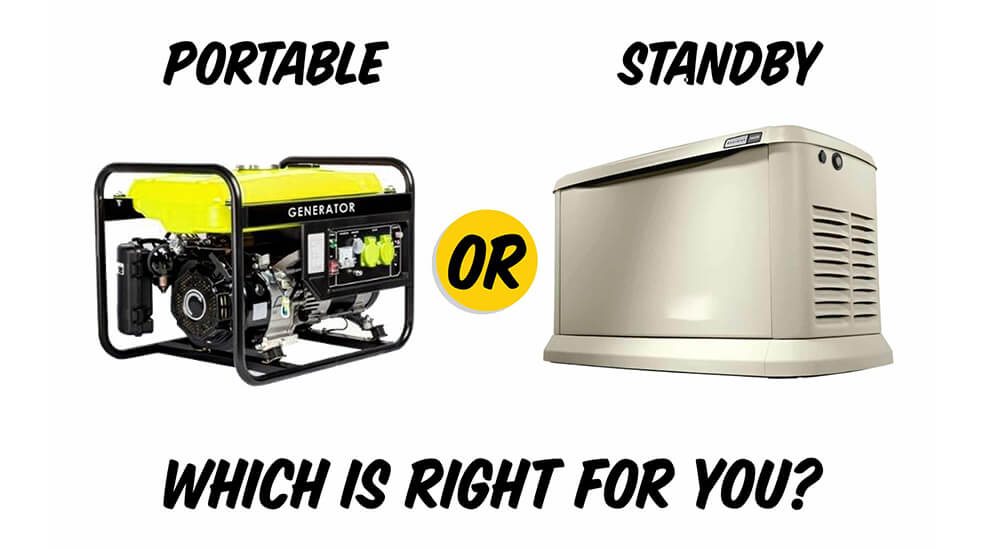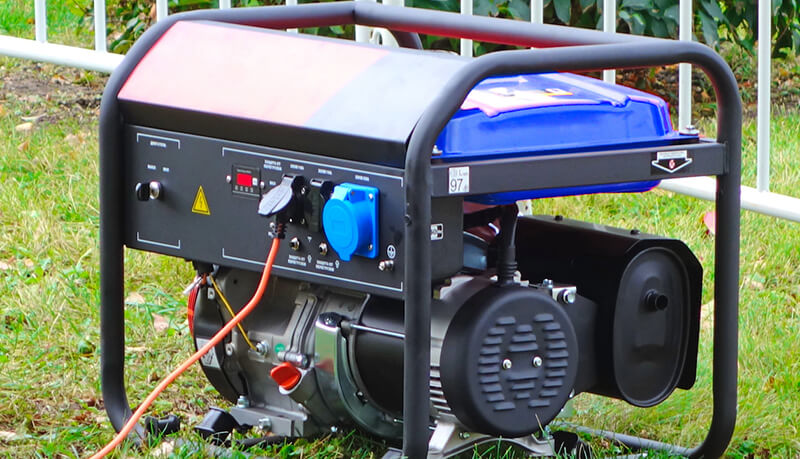06Jul 2024
table of contents

When summer heat reaches its zenith, unforeseen thunderstorms bring about power outages, everyday life can lurch to a halt. Instantly, soothing drone of air conditioner succumbs to silence, droplets bead on the refrigerator's surface, leaving you in a sweltering and dark isolation. In such instances, a dependable backup power source shifts from being a matter of convenience, to becoming an undeniable necessity for comfort and safety.
Both portable and standby generators serve essential roles during power failure, but they are designed to meet distinct situations and requirements. The choice for your depends on a clear understanding of each type's utility and its fitment to your unique needs.
In the ensuing sections of this article, we will delve into an analysis of pros and cons of each type of generator. The intention is to highlight their distinct functionalities and help guide you to choose, between a portable generator or a standby generator, the most suited power backup solution for your home.
Portable generators, as suggested by their moniker, are lightweight, movable units used for power generation. They are also referred to as standby generators, designed to deliver temporary power solutions, precisely where and when it is required. The most common types are compact super silent inverter generators and traditional open frame generators.
Pros
Affordable: Portable generators are an affordable option in the field of backup power. You can find reliable models for a fraction of the price of their permanently installed counterparts.
Portability: Want to power your campsite? Need electricity at a tailgate party? No problem! The lightweight nature of portable generators facilitates easy transport, rendering them an ideal solution for power requirements in transit.
Flexibility: From energizing essential household appliances during a blackout to operating equipment at an off-site location, portable generators can serve a variety of purposes.
Cons
Limited power output: Although portable generators can fulfill primary requirements, their power capacity typically falls short compared to their larger, standby counterparts. Consequently, it's important to prioritize and choose carefully what appliances you operate concurrently.
Noise pollution: Portable generators aren't known for quiet operation. Their engines can be quite loud, especially when running under heavy loads.
Manual operation: In contrast to automatic standby generators, portable variants demand that you initiate them manually, and connect them to your appliances.
Refueling requirements: Ready yourself for refuel regularly, particularly if you are operating your portable generator over longer durations.

In the realm of complete home backup power, standby generators are unparalleled. Installed permanently outdoors, these robust units are engineered to recoil start automatically during power failures, ensuring uninterrupted power supply for long stretches.
Pros
Automatic operation: The standout feature of standby generator is its automatic transfer switch. This component senses power interruption and immediately fires up generator, eliminating the nuisance of stumbling around in the dark.
Higher power output: Standby generators, in contrast to their portable counterparts, are incredibly potent. They are capable of energizing an entire household, facilitating heating and cooling systems, household appliances, and digital equipment.
Uses household fuel: Most standby generators run directly off of your home's existing natural gas or propane, with no refueling required.
Quieter operation: Standby generators are designed with noise reduction features that make them much quieter than portable generators.
Cons
Expensive: Be prepared for a hefty upfront investment. Standby generators bear a heftier price tag than portable generators, predominantly, due to variations in their size, unique attributes, and stipulations related to installation.
Professional installation is mandatory: Setting up a standby generator is not a task for amateurs. It requires the expertise of a competent electrician to manage the electrical linkages, relevant gas pipelines, and accurate positioning of the equipment.
Limited portability: As the name implies, standby generators are "on call" at your home. Once they are installed, can't be easily moved.
Selecting the appropriate generator for your requirements involves discerning the significant distinctions between portable and standby variations. Let's delve into these differences:
| Difference | Portable generator | Standby generator |
| Power output | Lower (range from 3000 to 10000 watts) | Higher (range between 8000 and 20000watts and more) |
| Run time | Limited by tank capacity (typically 6-12 hours) | Extended, typically several days or longer |
| Size | Compact and easy to operate | Large and permanently installed |
| Fuel type | Gasoline, propane, or dual-fuel options | Typically natural gas or propane |
| Installation | Plug and play, minimal setup | Requires professional installation |
| Operation | Manual start/stop | Automatic activation during power outages |
| Maintenance | Relatively simple DIY task | More complex, typically requires professional service |
| Portability | Easy to transport | Stationary, not meant for moving |
| Safety | Requires careful operation to prevent CO poisoning | Built-in safety features and professional installation minimize risk |
| Cost | Lower upfront cost | Large upfront investment |
Besides the significant contrasts illustrated in the table, here are a few additional distinctions:
Noise level: Portable generators are known for being noisy, while standby generators prioritize quieter operation.
Power needs: Carefully evaluate your basic power needs. Standby generators are better for whole-house power backup.
In actuality, all depends on your specific necessities and priorities ultimately. Consider your budget, power needs, desired level of convenience, and scenarios in which you anticipate needing generator power. If your goal is affordability and versatility for occasional use, portable generator may be the better choice. Imagine powering tools at a remote job site, keeping basic appliances running during a short power outage, or even enjoying the comforts of a campsite.
Should your main concern be uninterrupted, all-encompassing power backup that demands minimal exertion and offers optimum convenience during a prolonged power failure, then a standby generator is the optimum choice. Upon the onslaught of a storm and subsequent power loss, your backup generator springs into action autonomously, preserving power for your lighting, maintaining your refrigerator's function, and ensuring your home's comfort without any effort required on your part.
Ready to find your perfect power solution? Evaluate your budget, power needs, and the scenarios in which you’ll rely on generator power. Choose reliable and rugged generators to find the ideal choice, like the BISON generator series.
inquiry form here
BISON BLOG, All the latest news and views from Bison Machinery.